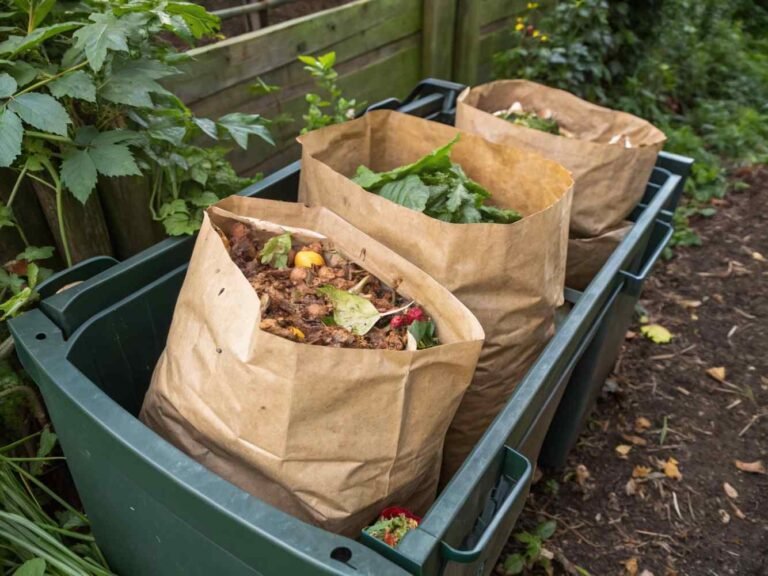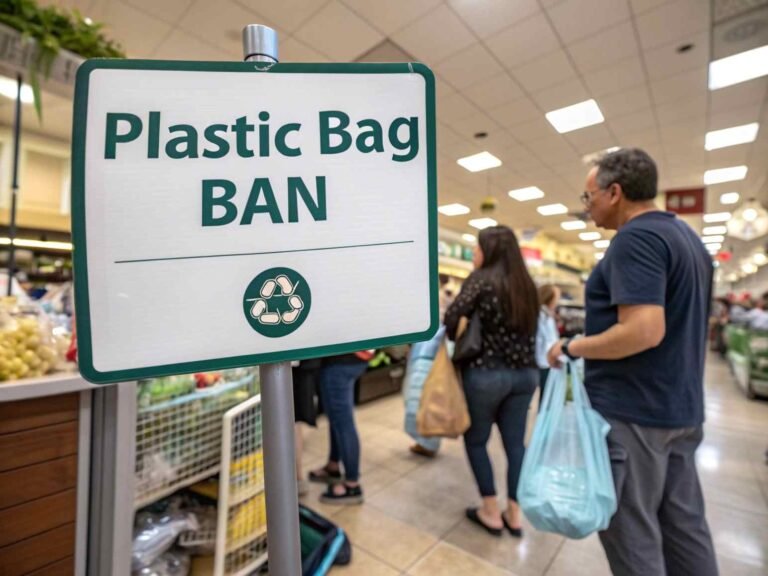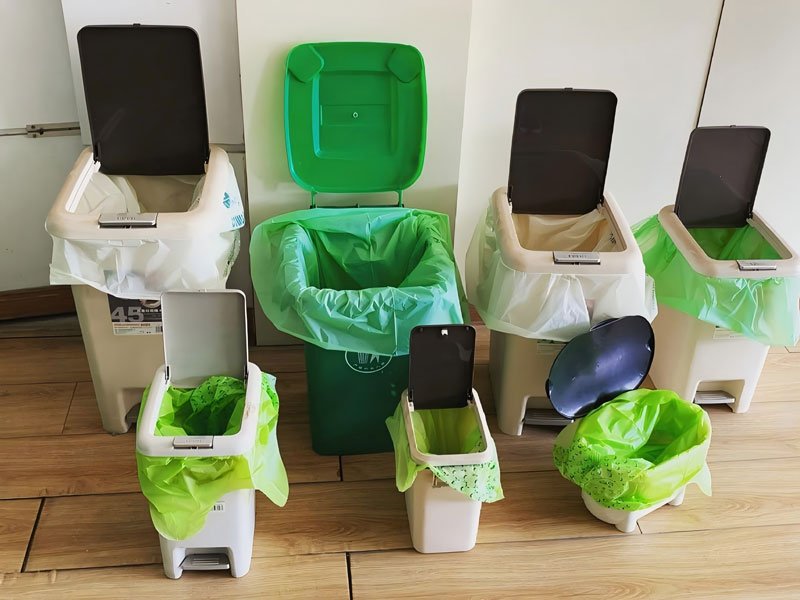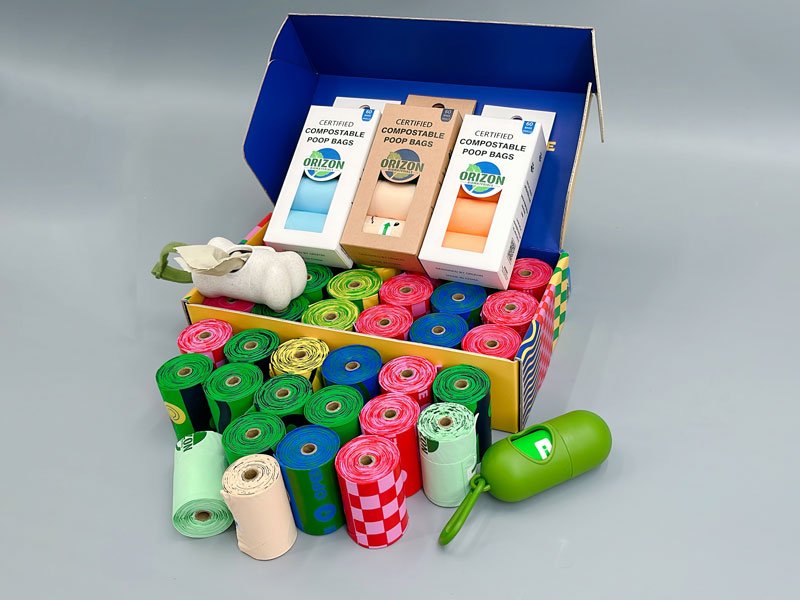With the rapid development of the sustainable packaging market, many companies are paying attention to compostable bags. Many environmentally friendly product business owners and purchasing managers of large retailers want to find the right compostable bag OEM supplier. But facing the numerous compostable bag OEM suppliers on the market, how to choose? It is a headache for everyone.
In this guide, as a compostdable bag manufacturer in China with 16 years of production experience, I will walk you through the factors to consider, from certification to customization, so that you can make a wise choice in 2025. Let's get started!
Why Choose Compostable Bags?
Environmental factors
The impact of global environmental policies such as the EU Green Deal and California SB 343 is further driving the shift to sustainable packaging. The government encourages the use of compostable materials to reduce plastic pollution and carbon footprint and ensure environmental sustainability.
Consumer demand
About 80% of consumers favor sustainable packaging, and brand influence cannot be ignored. Providing compostable packaging bags can link your brand with environmental protection and enhance customer loyalty.
OEM advantages
Working with compostable packaging OEM suppliers, brands can solve one-stop problems and save company costs from customization, cost control and reduced supply chain. OEM suppliers' expertise in production and manufacturing enables brands to focus on marketing and innovation while ensuring product quality and compliance.

How to Choose a Compostable Bag OEM Supplier
Product Certification:
Always check the supplier’s certification. Compostable bags are not just any plastic; they need to break down in a specific environment, so certification is crucial.
ASTM D6400 and D6868: US standards for compostable plastic certification. ASTM D6400 ensures that bags break down in commercial composting conditions, while D6868 applies to coated paper products like kraft bags.
BPI Certification: The Biodegradable Products Institute (BPI) is a third-party certification agency that tests products to ASTM standards. Having the BPI logo printed on your bag instantly adds to your brand’s credibility, especially in markets like the US or Canada.
OK Compost (TÜV Austria): This certification is essential for selling into the EU. The “Industrial” certification is for commercial composting, and the “HOME” certification is for backyard composting. Most OEM bags are certified for industrial environments, but the “HOME” certification is also required.
California SB 343 Compliance: For California, your suppliers need to comply with the labeling requirements of the law. This means clear “compostable” text and sometimes a green stripe or logo to avoid misleading claims.
Pro Tip: Don’t trust a supplier’s certification. See a copy and check it on the BPI website or ASTM database.
2.Materials
PLA (polylactic acid): Most commonly made from corn starch or sugar cane. The bags are clear and flexible, making them great for retail bags or food packaging. They tend to become brittle if left in a damp environment for too long.
Kraft paper: If you want a sturdier bag, like a shopping bag, kraft paper is great. Many now have a thin layer of PLA coating, so the whole bag is compostable. It has that natural, simple, eco-friendly feel that brands like.
EcoVio® or PBAT resins: More advanced compostable materials that are both sturdy and soft. They cost more, but are great if you need to carry important items, like trash bags.
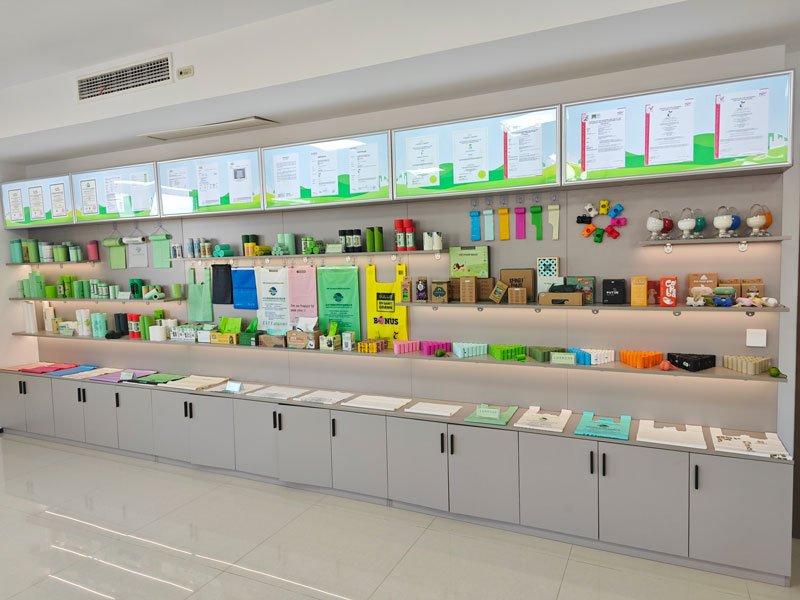
3.Customization
The biggest advantage of finding an OEM is that you can customize. Whether it's printing a logo, making a special size, or getting some special packaging, your supplier must be flexible and cooperative.
Printing: Do they print the logo clearly and beautifully? Remember to ask if the ink used is environmentally friendly (such as soy ink or water-based ink). Don't let printing hinder the "green" of your brand.
Size and shape: From small to large, from fruits and vegetables to garbage, the supplier must have a variety of ready-made sizes or be able to customize them according to your requirements.
Packaging: If you are selling to retailers, ask them if they can help you customize the labels (headers) on the boxes, put on separate labels, or make them in bulk for your convenience.
Design support: Some suppliers have their own designers who can help you with brand design. Especially if your company is small and you don't have a dedicated design team, this is a lifesaver!
4.Production capacity
Production capacity: Directly ask the supplier about the production capacity in one month and how long it will take to deliver.
Minimum order quantity (MOQ): Some factories have extremely high MOQs, which are out of reach for small companies. If you are just starting out, it is best to find one with a flexible MOQ.
Delivery time: For custom-made bags, it usually takes 4 to 12 weeks from ordering to receiving them. The more complicated the bags, the longer it will take.
Global transportation: How much is the shipping cost for importing from abroad (such as China)? What are the transportation channels? Is customs clearance troublesome?
Quality control: Is the product really compostable? Ask about the specific inspection and testing procedures, etc.
5.Is it helpful?
Is the price transparent? Mold fee, printing plate fee, shipping fee?
How about samples? Most of them provide samples. How is the price! If you really want to cooperate, it is best to find one with reasonable sample fees or even free of charge.
Is the customer service helpful? Do they reply to your messages quickly? Do you understand compost bags and the rules and regulations? Ask a few questions before signing the contract and you will know.

Navigating Regulations and Certifications
ASTM D6400/D6868: Rules set by the United States, specifically for compostable plastics.
BPI certification: A third-party agency comes to test and prove that your bag is really compostable.
California SB 343: Requires that compostable bags must be printed with a striking "green stripe" mark. This is to prevent manufacturers from selling fake products under false pretenses (engaging in "greenwashing").
Washington State regulations: Similar to California, it also requires clear labeling and compliance.
How to Evaluate Compostable Bag Suppliers:
Ask for samples: Try it yourself: Is the material strong enough? Is the printing clear? Is the composting promise reliable? These should be verified in person.
Supplier reputation: Search their reviews online (platforms like Alibaba and ThomasNet usually have supplier ratings) and read what others say.
Verify the authenticity of the certificate: Check the BPI website or ASTM database to confirm that it is authentic.
Multiple quotations: Ask for quotations from several suppliers (3 to 5) and compare prices, minimum order quantities (MOQs) and delivery times. Good quality is the most important!
Factory inspection for large orders: If the order is large, seriously consider visiting the factory in person or asking a reliable third party to inspect their equipment and production.
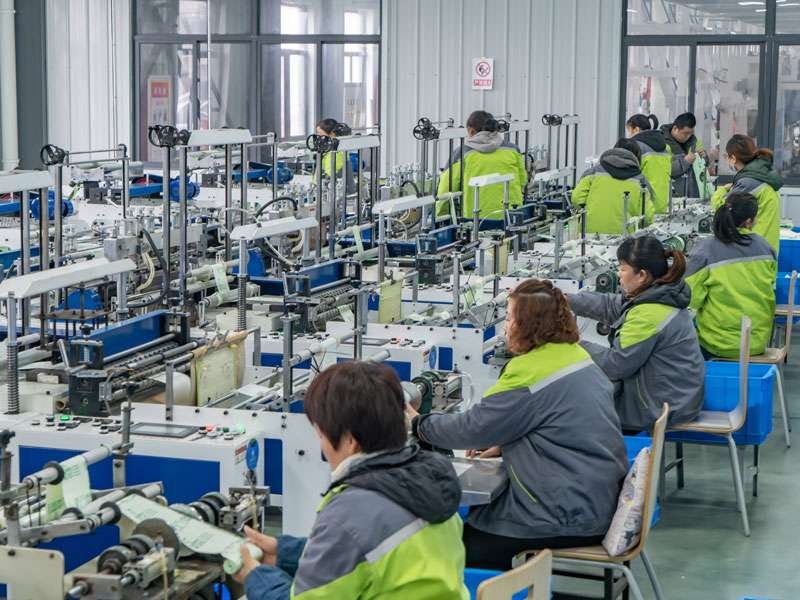
Conclusion
Find an experienced and certified compostable bag OEM factory, and you will have a stable future in eco-friendly packaging! Focus on finding a supplier with reliable quality, up-to-standard certifications, and the flexibility to customize for you.
Want to find such a reliable partner? Let's talk about our OEM service! Our bags are actually ASTM certified, helping you make your eco-friendly packaging more presentable and professional!
FAQs
What certifications do bags need to have to be considered reliable?
ASTM D6400, D6868, BPI or OK Compost. With these, you can basically guarantee that your bags can really be decomposed in commercial composting plants.
How long does it take to order a batch of custom compost bags?
It usually takes 4 to 12 weeks. The specific time depends on how much you order and how complicated you want it to be (such as special printing, special size, etc.).
Will the OEM factory accept small batch orders?
Many factories are quite flexible in their minimum order quantity (MOQ) and can accept small orders. But don't take it for granted. Be sure to ask clearly when negotiating! Otherwise, you will find out that the MOQ is shockingly high in the end.
Why is certification so important for compost bags?
Certification (such as BPI) can really guarantee that your bag can really rot in an industrial composting plant (or a home composting pit), and will not release toxins when decomposing to fool people.
Is the supplier reliable? How to check his background?
Basic license: Does it have a serious ISO certification (such as ISO 9001 for quality and 14001 for environmental protection)?
Professional certification: For hard brands that specialize in compost packaging - such as BPI or OK Compost, you can find a list on the official website and verify the authenticity yourself!
For small orders for a startup, what is a reasonable minimum order quantity?
Many factories in North America or Europe can accept small orders of 1,000-5,000 pieces. Just ask "Can you do small batches?"
How can I get the goods quickly when working with Asian suppliers?
For important orders, set the production schedule 3-6 months in advance, don't cram at the last minute.
Urgent goods should be shipped by air! Can't wait? Pay extra for air shipping.
What material is the safest for bags for food?
PLA (made of corn starch) + mixed PBAT, this combination meets the food safety standards of the US FDA and the EU EC, and is fine for direct contact with food.
How much more expensive are compost bags than ordinary plastic bags?
Large quantities can be cheaper: the unit price of compost bags is about $0.07-$0.12 (RMB 0.5-0.8); ordinary PE bags are only $0.03-$0.06 (RMB 0.2-0.4). It is a bit expensive, but the environmentally friendly attributes can impress those "green" customers, and you can still make money if you calculate the accounts.

